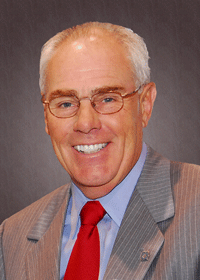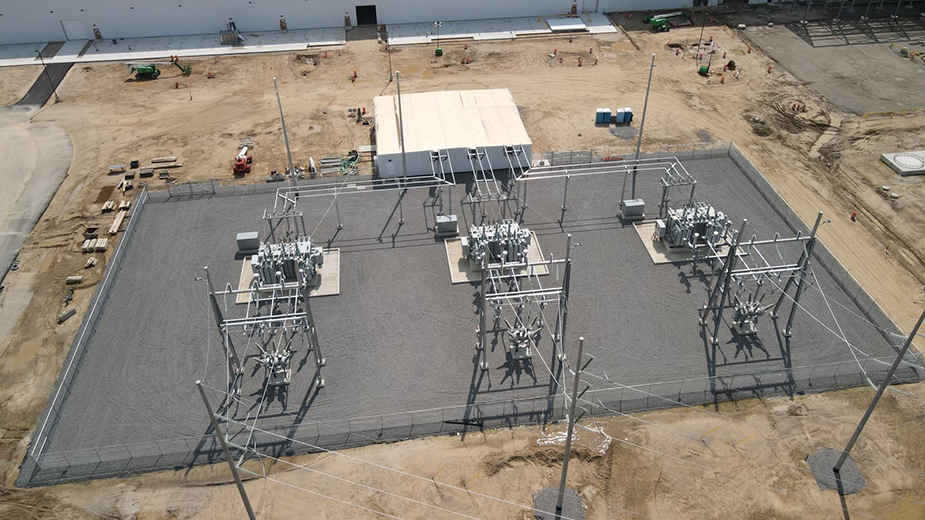GIRARD, Ohio – Statistically, the second generation of a family business has the hardest time surviving, says Tricia Ferry, executive vice president of operations at VEC Inc.
Fortunately for the provider of construction solutions based in Girard, a small army of CEO Rex Ferry’s family is at the helm.
Twelve members of the family work for the company, including Tricia Ferry, her sister Rachel Barber, executive vice president of finance, and their cousin Dominic Spelich, executive vice president of client services. Barber’s husband, Jeff, is executive vice president of projects and their daughter is part of the power restoration team in the field.
Ferry’s fiancé, Brune Frate, is the company’s vice president of its civil and infrastructure division.
At one time or another, as many as 27 Ferry family members were working at VEC, Spelich says.

“If you’re a family member of ours and you didn’t work here, then you chose not to,” Spelich says. “Uncle Rex and Aunt Mary have extended the invitation to any family member for an opportunity to take part in the family business.”
Ferry, Barber and Spelich all started in the 1990s working in the warehouse as teenagers, sweeping the floors and washing vehicles. Now, as second-generation leaders of the company, they take pride in building upon the foundation Rex Ferry established and ensuring “that we have a sustainable company for years to come,” Barber says.
Part of that is adding new services and expanding the service footprint of the company – thus continuing Rex Ferry’s vision when he purchased VEC in 1990, Tricia Ferry says.
The company was founded in 1975 as Valley Electrical Consolidated Inc., a small mom-and-pop shop generating $3 million to $5 million in annual revenue with a staff of 12, she says. Rex came up through the journeyman wireman program with the nearby IBEW local and became a field leader for Valley Electrical.
“They recognized his talent and brought him into the company as a project manager, and then a vice president,” Ferry says. “Then, the great visionary that Rex is, he’s been able to diversify through talent within the company the different divisions and services that we offer today.”
A milestone in growth of the company came in 2003, when Valley Electrical acquired Evets Electric, which focused entirely on electrical work in oil and gas pipeline projects, Spelich says. By adding civil and mechanical engineering capabilities to that group, the newly named Evets Oil & Gas Construction Services could contract directly with oil and gas companies instead of being just a subcontractor.
In 2016, Valley Electrical and Evets consolidated into VEC Inc. Today, the company employs 69 internal staff and just over 220 union field workers. It serves customers in 11 states.
The consolidation allowed VEC to capitalize on increased work in the Marcellus and Utica shale plays, where it had already been working, Spelich says.
“Before other contractors started adding it as a service, we were already involved with it,” he says. “That helped us grow too – because the opportunities started to present themselves more and more and more.”
As a result, the company found itself working closer to home, he says. For years, it was common for VEC superintendents to be on the road, living in motorhomes and returning between jobs.
“There just wasn’t a lot of opportunity in the Mahoning Valley,” he says. “So we learned to be a traveling contractor.”
But when the Marcellus and Utica took off, “These opportunities are basically in our backyard,” he says. Today, about 60% of the work of the company lies within a two-hour radius.
Local jobs increased with major projects in the area. Among them are construction projects for Lordstown Motors Corp. and Ultium Cells LLC in Lordstown, the expansion of the Ashta Chemicals plant in Ashtabula and the Shell Pennsylvania Chemicals plant in Monaca, Pa. – all of which VEC’s Industrial Electrical Division has been a part.
Currently, VEC has about 70 workers at the Monaca cracker plant, another 20 to 30 at Ultium and others at Lordstown Motors.
VEC has been a part of projects in Lordstown for some time, Barber says. The former Valley Electrical Consolidated was founded on industrial automotive work. The General Motors Lordstown Assembly Plant – which Lordstown Motors took over in December 2019 – accounted for much of the company’s work, she says.
“Now, it’s kind of exciting to come back to the new Ultium and Lordstown Motors,” Barber says. “I know they’re different companies in different sections [of the village]. But we’re still out there in the Lordstown area representing VEC.”

In the last couple of years, the company has added new divisions to further its expansion. These include Civil & Infrastructure, which serves the automotive, manufacturing, oil and gas, and infrastructure markets, and Power Restoration & Distribution, which performs restoration work of downed utility lines from severe weather.
With the new divisions, VEC is on track for a 25% increase in business overall year-to-year. And with the Biden administration’s $1 trillion bipartisan infrastructure bill moving toward passage, the team is preparing for whatever work may come.
“We have structured ourselves to handle many of the different industries that have come about in the last several years,” Barber says. “So just having the civil infrastructure division that was generated last year, and then even our power restoration division that handles the high voltage, we’ve really aligned ourselves well for the infrastructure business that is coming about.”
Diversification also allows the company to be more selective about the work it accepts, Spelich adds, and ensures the work is balanced between its five divisions.
“All five probably aren’t going to run at top capacity year after year. But one or two of them are,” he says. “No opportunity is off the table. We look at them all, no matter where it’s located. It’s just a matter of manpower availability.”
Regarding manpower, VEC works closely with IBEW Local 573 to hire based on project needs and brings on graduating high school seniors who go through the local’s Construction Electrician/Construction Wireman, or CE CW program.
CE CW is “like a step below the apprenticeship in the regular IBEW,” Spelich says. Participants are still paid through the union and their dues go to the union. The program is like a stepping-stone to an apprenticeship.
“We’ve had a whole bunch of success with that,” Spelich says. “Not only for our company, personally, but some of the kids or young adults that we’ve got through there. They’ve made success in themselves by getting in the apprenticeship.”
For high school seniors who participate in an apprenticeship program, they are paid to learn on the job, Barber adds. After completing an apprenticeship, new workers who put in 2,080 hours annually can make $60,000 to $70,000.
“That’s with no overtime,” Barber says. “And there’s so much overtime locally right now.”
VEC has witnessed several success stories of students going from the classroom at TCTC’s Electrical Technology program to work in the field, adds Ferry. This year, a junior at TCTC will be working with VEC next summer, she says.
“Sometimes, the pool is very low. But if we can get one or two each summer to come and work and they graduate, then we can take them right out into the field,” Ferry says.
VEC also offers internships for engineering students. This year, two from Youngstown State University and one from Kent State University will be coming aboard.
In an effort to retain their workers, VEC focuses on company culture and its core values of faith, family and community, Ferry says. Leadership works to remain transparent and holds themselves accountable to the employees, she says, up to and including meeting with workers out in the field.
Part of that transparency is demonstrated with the leadership team’s morning call to review the day’s agenda and where projects stand, she says. Those meetings are recorded and viewable by all employees.
For those who grew up in VEC, these efforts are key to maintaining a company where people want to work and continuing the legacy for Rex and Mary Ferry.
“We’ve got a great synergy here with everybody that works within
the company, whether you’re in-house or out in the field,” Ferry says. “It’s been a lot of fun and that’s important to me.”
Pictured: From left are Jason McClellan, vice president of oil and gas; Brandon Davies, vice president of systems integrator; Jeff Barber, executive vice president, projects; Rachel Barber, executive vice president, finance; Dominic Spelich, executive vice president, client services; Mike Reiser, vice president of industrial; Tricia Ferry, executive vice president, operations; Bruno Frate, vice president of civil and infrastructure; Ron Remsey, vice president of power restoration.
